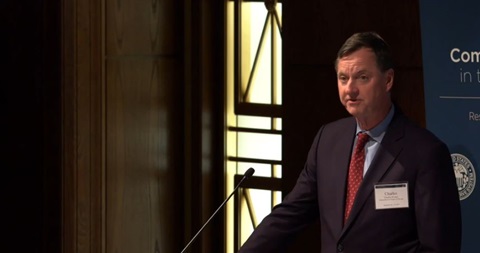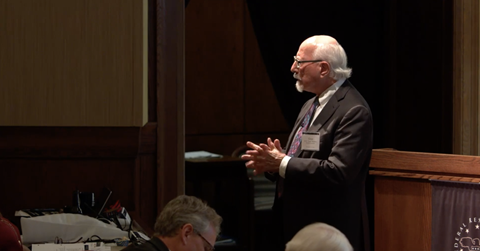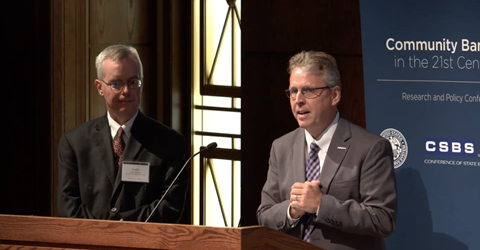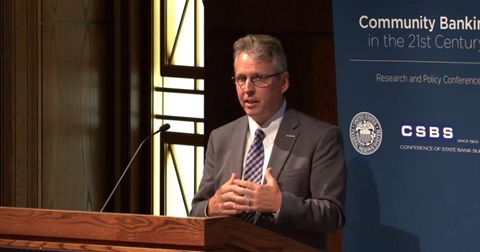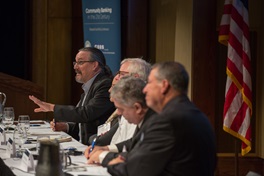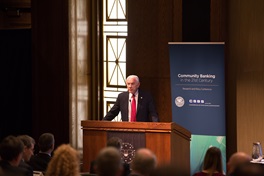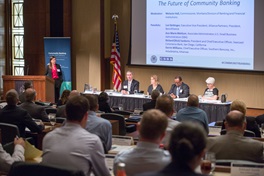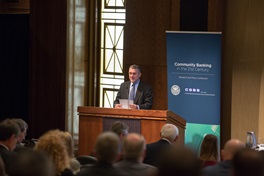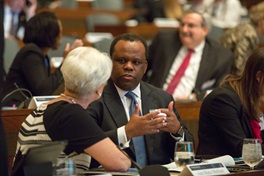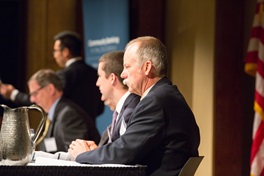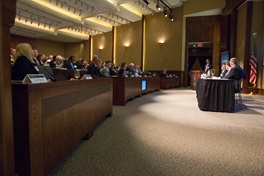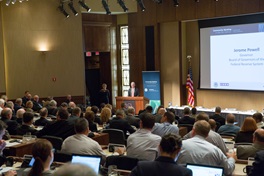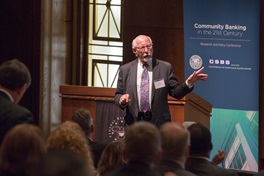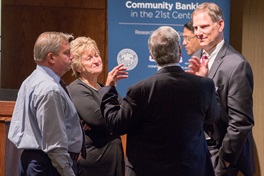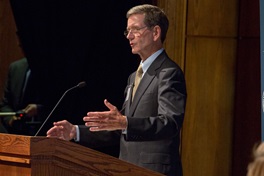
Community Banking in the 21st Century
The fourth annual Federal Reserve System/ Conference of State Bank Supervisors Community Banking in the 21st Century Research and Policy Conference took place September 28-29 at the Federal Reserve Bank of St. Louis. The research conference brought together community bankers, academics, policymakers, and bank regulators to discuss the latest research on community banking.
The Federal Reserve/CSBS research conference presents an innovative approach to the study of community banks. Academics explore issues raised by the industry in a neutral, empirical manner and present their findings at the conference. Community bankers contribute through participation on discussion panels and feedback to the research presented, by contributing to an annual national survey, and by serving as keynote speakers at the conference.
Federal Reserve Governor Jay Powell gave opening remarks at the fourth annual conference. Other guest speakers will included CSBS President and CEO John Ryan and Federal Reserve Bank of St. Louis President James Bullard.
The call for papers for the conference opened Feb 2, 2015.
For more information, please contact conference@communitybanking.org.
Conference Agenda
Gateway Auditorium, 6th Floor | Federal Reserve Bank of St. Louis
September 28-29, 2016
Download as PDF
- Wednesday, September 28
-
Welcoming Remarks
-
Research Paper Session 1
The Continuing Relevance and Importance of the Community Bank Business ModelIs the Traditional Banking Model a Survivor?Vincenzo Chiorazzo, Vincenzo D'Apice, Pierluigi Morelli, Italian Banking Association; and Robert DeYoung,University of KansasBank Business Models in the US: Identification, Performance, Risks and RegulationRym Ayadi, HEC Montreal
Why Banks Matter: Measuring the Impact of Banks on Missouri's EconomyJoseph H. Haslag, University of MissouriThe Changing Face of Communities Served by Minority Depository Institutions: 2001 - 2014 (PDF)Russell D. Kashian, Fernanda Contreras and Claudia Perez-Valdez, University of Wisconsin – WhitewaterReaction to the Continuing Relevance and Importance of the Community Bank Business Model Session- Robin A. Prager and William Dana Jr.The Continuing Relevance and Importance of the Community Bank Business Model - Moderated Question and Answer Session -
Break
-
Networking and Lunch
-
Afternoon Keynote Address
-
Break
-
Research Paper Session 2
 Moderator: Cynthia Course
Moderator: Cynthia Course
Director, Financial Insitution Supervision and Credit, Federal Reserve Bank of San Francisco
Is Bigger Necessarily Better in Community Banking?Joseph P. Hughes, Julapa Jagtiani, and Loretta J. Mester Rutgers University; Federal Reserve Bank of Philadelphia; Federal Reserve Bank of ClevelandBank Size, Compliance Costs and Compliance Performance in Community BankingDrew Dahl, Andrew Meyer and Michelle Neely Federal Reserve Bank of St. LouisHas the Relationship Between Bank Size and Profitability Changed?Kristen Regehr and Rajdeep Sengupta, Federal Reserve Bank of Kansas CityReaction to the Relationship Between Community Bank Size and Performance Session- Cynthia Course and Allan (Al) LandonThe Relationship Between Community Bank Size and Performance - Moderated Question and Answer Session -
Break
-
Presentation of Winning Case Study and Video from the 2016 CSBS Community Bank Case Study Competition
-
Dinner Reception
-
Evening Keynote Address
- Thursday, September 29
-
Morning Keynote Address
-
Research Paper Session 3
 Moderator: Todd Vermilyea
Moderator: Todd Vermilyea
Senior Associate Director and Economist, Board of Governors of the Federal Reserve System
Did Capital Requirements in the Early 20th Century U.S. Promote Bank Stability? (PDF)Michael Gou, University of California at IrvineDodd-Frank's Federal Deposit Insurance ReformKyle D. Allen, Louisiana Tech University; Travis R. Davidson, Ohio University; Scott E. Hein, Texas Tech University; and Matthew D. Whitledge, Coastal Carolina UniversityCommercial Lending Concentration and Bank Expertise: Evidence from Borrower Financial StatementsPhilip G. Berger and Michael Minnis, University of Chicago; and Andrew Sutherland, Massachusetts Institute of TechnologyReaction to the Community Bank Regulatory Issues Session Todd Vermilyea and Glen JammaronCommunity Bank Regulatory Issues- Moderated Question and Answer Session -
Break
-
2016 National Survey of Community Banks Presentation of Results
Presentation Results -
Networking and Lunch
-
Panel Discussion: Community Banking in the 21st Century: 2016 National Survey of Community Banks and State Roundtables
Panelists Lori Bettinger
Lori Bettinger
Executive Vice President, Alliance Partners; President, BancAlliance , Alliance Partners/ BancAlliance
Discussion Topic 1How do you see regulatory burden impacting the community banking industry in the short term? Long term? (Sanborn / Williams)
Discussion Topic 2Looking ahead 10 years, what aspects of the community bank business model will undergo the most dramatic change? Which will likely remain unchanged? (Bettinger / Mehlum)
Moderated Question and Answer Session -
Conference Wrap-up
-
Conference Adjourn
Research Papers, Authors and Key Findings
Research Paper Session 1
The Continuing Relevance and Importance of the Community Bank Business Model
Is the Traditional Banking Model a Survivor?
Authors: Robert DeYoung, University of Kansas; Vincenzo D'Apice, Italian Banking Association; Vincenzo Chiorazzo, Italian Banking Association; Pierluigi Morelli, Italian Banking Association
Key Findings: Banks with business models normally associated with community banking—that is, those that emphasize relationship loans, core deposit funding, revenue streams from traditional banking products and physical branches--were less likely than other banks to fail, be acquired or absorbed into parent holding companies, 1997 to 2012. The survival advantage was accentuated during the financial crisis.
Bank Business Models in the US: Identification, Performance, Risks and Regulation
Rym Ayadi, HEC Montreal
Why Banks Matter: Measuring the Impact of Banks on Missouri's Economy
Author: Joseph Haslag, University of Missouri
Key Findings: A hypothetical withdrawal of Missouri banks from commercial and agricultural lending would cause job losses reducing employment by five percent and result in (discounted) output losses over the next 25 year equal to two-thirds of Missouri's current GDP.
The Changing Face of Communities Served by Minority Depository Institutions 2001 to 2015
Authors: Claudia Perez-Valdez, Perez-Valdez; Russell Kashian, University of Wisconsin – Whitewater; Fernanda Contreras, University of Wisconsin – Whitewater
Key Findings: Black-owned banks declined in number, 2000 to 2014, while banks owned by Asian Americans, Native Americans and Hispanics increased. Black-owned banks became increasing isolated in highly segregated communities where poverty is prevalent
Reaction to the Continuing Relevance and Importance of the Community Bank Business Model Session- Robin A. Prager and William Dana Jr.
The Continuing Relevance and Importance of the Community Bank Business Model - Moderated Question and Answer Session
Research Paper Session 2
Is Bigger Necessarily Better in Community Banking
Authors: Julapa Jagtiani, Federal Reserve Bank of Philadelphia; Joseph Hughes, Rutgers University; Loretta Mester, Federal Reserve Bank of Cleveland
Key Findings: The paper examines the overall economies of scale among publicly traded banks, as of 2013, and finds that large banks (assets more than $10 billion) are more efficient than large community banks and large community banks are more efficient than small community banks in terms of their abilities to achieve high market values for assets. The authors also find that large community banks, but not small community banks or large banks, enhance their performance (become more efficient) by originating more small business loans.
Bank Size, Compliance Costs and Compliance Performance in Community Banking
Authors: Michelle Neely, Federal Reserve Bank of St Louis; Andrew Meyer, Federal Reserve Bank of St. Louis; Drew Dahl, Federal Reserve Bank of St Louis
Key Findings: Economies of scale in satisfying regulatory requirements were evident in a sample of 469 community banks surveyed in 2015. Higher (lower) compliance expenses, moreover, did not necessarily lead to better (worse) regulatory ratings.
Has the Relationship Between Bank Size and Profitability Changed
Authors: Rajdeep Sengupta, Federal Reserve Bank of Kansas City; Kristen Regehr, Federal Reserve Bank of Kansas City
Key Findings: Profitability increased with size for community and regional banks, but at a decreasing rate, 2001 to 2014. Regulatory changes imposed in the aftermath of the financial crisis, including the Dodd-Frank Wall Street Reform and Consumer Protection Act, did not significantly alter earlier relationships between size and profitability, suggesting that community banks have not been "disadvantaged relative to their larger competitors."
Reaction to the Relationship Between Community Bank Size and Performance Session- Cynthia Course and Allan (Al) Landon
The Relationship Between Community Bank Size and Performance - Moderated Question and Answer Session
Research Paper Session 3
Did Capital Requirements in the Early 20th Century US Promote Bank Stability
Author: Michael Gou, University of California at Irvine
Key Findings: Banks subject to higher capital requirements in 1905 did not experience less leverage or lower subsequent rates of failure. This suggests that capital requirements were ineffective in promoting bank stability.
Dodd-Frank Federal Deposit Insurance Reform
Authors: Kyle Allen, Louisiana Tech University; Travis Davidson, Ohio University; Scott Hein, Rawls College of Business, Texas Tech University; Journal of Financial Research; Matthew Whitledge, Coastal Carolina University
Key Findings: The Dodd-Frank Wall Street Reform and Consumer Protection Act shifted the basis on which deposit insurance fees are assessed from deposits to all liabilities, while, at the same time, lowered assessment rates. Because community banks rely disproportionally on deposits to fund assets, they benefited from these changes: In the first year of the new assessment mechanism, in 2011, they paid about $744 million less than they would have under the prior system.
Commercial Lending Concentration and Bank Expertise -Evidence from Borrower Financial Statements
Authors: Phillip Berger, University of Chicago; Michael Minnis, University of Chicago; Andrew Sutherland, Massachusetts Institute of Technology
Key Findings: Banks were less likely to collect audited financial statements from firms operating in industries in which they (the banks) had greater numbers of borrowers, 2002 to 2011, which is consistent with a hypothesis that industry knowledge serves as a substitute for verified financial information. The negative relation between industry exposure and audited statement collection strengthens as the bank gains experience. Both findings are interesting insofar as community banks rely on "soft" information, such as personal relationships with borrowers, rather than "hard" information, such as credit scores.
Reaction to the Community Bank Regulatory Issues Session Todd Vermilyea and Glen Jammaron
Community Bank Regulatory Issues- Moderated Question and Answer Session
Speakers and Panelists
 Lori Bettinger is an executive vice president of Alliance Partners and the president of BancAlliance. Prior to joining Alliance Partners, Bettinger served as the director of the Troubled Asset Relief Program (TARP) Capital Purchase Program at the U.S. Department of the Treasury, focusing on the implementation, investing, and restructuring cycles of its $205 billion portfolio. From 2004-2008, she was a financial economist with the U.S. Securities and Exchange Commission's Division of Trading and Markets. Bettinger received her Master of Arts from the Johns Hopkins School of Advanced International Studies and her Bachelor of Arts from Yale University.
Lori Bettinger is an executive vice president of Alliance Partners and the president of BancAlliance. Prior to joining Alliance Partners, Bettinger served as the director of the Troubled Asset Relief Program (TARP) Capital Purchase Program at the U.S. Department of the Treasury, focusing on the implementation, investing, and restructuring cycles of its $205 billion portfolio. From 2004-2008, she was a financial economist with the U.S. Securities and Exchange Commission's Division of Trading and Markets. Bettinger received her Master of Arts from the Johns Hopkins School of Advanced International Studies and her Bachelor of Arts from Yale University.

James Bullard is the president and CEO of the Federal Reserve Bank of St. Louis. In that role, he is a participant on the Federal Reserve’s Federal Open Market Committee (FOMC), which meets regularly to set the direction of U.S. monetary policy. He also oversees the Federal Reserve’s Eighth District, including activities at the St. Louis headquarters and its branches in Little Rock, Arkansas, Louisville, Kentucky, and Memphis, Tennessee. A noted economist and policymaker, Bullard makes Fed transparency and dialogue a priority on the international and national stage as well as on Main Street. He serves on the board of directors of the St. Louis Regional Chamber and the board of directors of Concordance Academy of Leadership, and he is a past board chair of the United Way U.S.A. Bullard is co-editor of the Journal of Economic Dynamics and Control, and a member of the Central Bank Research Association’s senior council. He is an honorary professor of economics at Washington University in St. Louis, where he also sits on the advisory council of the economics department and the advisory board of the Center for Dynamic Economics. A native of Forest Lake, Minnesota, Bullard received his doctorate in economics from Indiana University in Bloomington.
 Charles G. Cooper was appointed Texas Banking Commissioner by the Texas Finance Commission on December 1, 2008. His banking career spans over 45 years and includes senior level positions in both the public and private sectors. As Texas Banking Commissioner, his responsibilities include the chartering, regulation, supervision and examination of 264 Texas state-chartered banks with aggregate assets of approximately $241.9 billion. His duties also encompass trust companies, foreign bank agencies and branches, non-bank supervision programs that include the licensing, regulation and supervision of funeral contract providers, perpetual care cemeteries, and money service businesses, as well as the registration of private child support enforcement agencies. He also serves as chairman-elect of the Conference of State Bank Supervisors. A native Texan, Cooper holds a Bachelor of Business Administration degree in finance and economics from Baylor University and is a graduate of the Southwestern Graduate School of Banking at Southern Methodist University. He also holds an advanced peace officer certification with the Texas Commission on Law Enforcement. He has been on the board of the Fort Worth Stock Show Syndicate since 1990 and has been a member of the State Fair of Texas Youth Livestock Auction Committee since 2005.
Charles G. Cooper was appointed Texas Banking Commissioner by the Texas Finance Commission on December 1, 2008. His banking career spans over 45 years and includes senior level positions in both the public and private sectors. As Texas Banking Commissioner, his responsibilities include the chartering, regulation, supervision and examination of 264 Texas state-chartered banks with aggregate assets of approximately $241.9 billion. His duties also encompass trust companies, foreign bank agencies and branches, non-bank supervision programs that include the licensing, regulation and supervision of funeral contract providers, perpetual care cemeteries, and money service businesses, as well as the registration of private child support enforcement agencies. He also serves as chairman-elect of the Conference of State Bank Supervisors. A native Texan, Cooper holds a Bachelor of Business Administration degree in finance and economics from Baylor University and is a graduate of the Southwestern Graduate School of Banking at Southern Methodist University. He also holds an advanced peace officer certification with the Texas Commission on Law Enforcement. He has been on the board of the Fort Worth Stock Show Syndicate since 1990 and has been a member of the State Fair of Texas Youth Livestock Auction Committee since 2005.
 Cynthia Course serves as a director in the Federal Reserve Bank of San Francisco's Financial Institution Supervision and Credit Division. In this role, she primarily is responsible for assisting in policy development, advising senior management on supervisory policy issues, and assessing the implications of the Dodd-Frank Act and other regulatory changes on supervisory processes. Prior to joining the San Francisco Fed in 2011, Course spent 17 years at the Federal Reserve Bank of Philadelphia in several areas, including community and regional bank supervision. Before joining the Federal Reserve, she worked for 12 years in the banking industry, most recently for a multi-bank, $800 million community bank holding company in New Jersey. Course graduated from the Stonier Graduate School of Banking in 1991, where her thesis, Evaluating the Nature and Profitability of Public Funds Account Relationships in New Jersey, was awarded library designation. She is a summa cum laude graduate of Rider College, Lawrenceville, N.J., where she received a Bachelor of Science degree in accounting, and a master's degree in business administration with distinction. She is a certified public accountant licensed in New Jersey and Arizona.
Cynthia Course serves as a director in the Federal Reserve Bank of San Francisco's Financial Institution Supervision and Credit Division. In this role, she primarily is responsible for assisting in policy development, advising senior management on supervisory policy issues, and assessing the implications of the Dodd-Frank Act and other regulatory changes on supervisory processes. Prior to joining the San Francisco Fed in 2011, Course spent 17 years at the Federal Reserve Bank of Philadelphia in several areas, including community and regional bank supervision. Before joining the Federal Reserve, she worked for 12 years in the banking industry, most recently for a multi-bank, $800 million community bank holding company in New Jersey. Course graduated from the Stonier Graduate School of Banking in 1991, where her thesis, Evaluating the Nature and Profitability of Public Funds Account Relationships in New Jersey, was awarded library designation. She is a summa cum laude graduate of Rider College, Lawrenceville, N.J., where she received a Bachelor of Science degree in accounting, and a master's degree in business administration with distinction. She is a certified public accountant licensed in New Jersey and Arizona.
 William M. Dana, Jr. is the president and chief executive officer of Central Bank of Kansas City, a $150 million community bank located in the urban core of Kansas City, Mo. The bank is a certified Community Development Financial Institution and has been rated "outstanding" by the Federal Deposit Insurance Corporation for its last five Community Reinvestment Act exams, dating back to 1995. Dana has had varying degrees of experience in all levels of community bank management for more than 45 years. He began his career as a teller and has worked every phase of banking up to his current position, which he has held for the past 25 years. Dana has served on numerous civic, social and trade association boards. His service includes recent roles as a board member of the American Bankers Association, chairman of the Missouri Bankers Association and chairman of the ABA Foundation. Dana is a past chairman and current board member of the Community Development Bankers Association. Dana has been called upon to speak on many banking industry topics including consumer compliance, community development and bank profitability. He has spoken before the FDIC, the Office of the Comptroller of the Currency, the Missouri Division of Finance, U.S. House of Representatives subcommittees, trade associations and various banking organizations.
William M. Dana, Jr. is the president and chief executive officer of Central Bank of Kansas City, a $150 million community bank located in the urban core of Kansas City, Mo. The bank is a certified Community Development Financial Institution and has been rated "outstanding" by the Federal Deposit Insurance Corporation for its last five Community Reinvestment Act exams, dating back to 1995. Dana has had varying degrees of experience in all levels of community bank management for more than 45 years. He began his career as a teller and has worked every phase of banking up to his current position, which he has held for the past 25 years. Dana has served on numerous civic, social and trade association boards. His service includes recent roles as a board member of the American Bankers Association, chairman of the Missouri Bankers Association and chairman of the ABA Foundation. Dana is a past chairman and current board member of the Community Development Bankers Association. Dana has been called upon to speak on many banking industry topics including consumer compliance, community development and bank profitability. He has spoken before the FDIC, the Office of the Comptroller of the Currency, the Missouri Division of Finance, U.S. House of Representatives subcommittees, trade associations and various banking organizations.
 Shane Deal was appointed deputy commissioner overseeing the Minnesota Department of Financial Institutions on June 3, 2013, by Minnesota Department of Commerce Commissioner Mike Rothman. Deal's career in the banking industry spans more than 20 years and includes senior positions within the industry. As deputy commissioner, Deal is responsible for regulatory oversight of state-chartered financial institutions and non-depository entities conducting business in the state of Minnesota, including state-chartered banks, thrift companies, credit unions, trust companies, finance companies, mortgage-related businesses and other licensees. Deal left his position at the Minnesota Division of Commerce in February 2017. He is also a former board member on the Conference of State Bank Supervisors' board of directors, and is the former chairman of CSBS' community bank steering committee. Deal is also active with the National Association of State Credit Union Supervisors, the American Association of Residential Mortgage Regulators and the Money Transmitter Regulators Association. Prior to his current position, Deal was senior vice president and market president at Bank Midwest, New Ulm, Minn. He also served as market president at North American State Bank in Willmar, Minn., and as community bank president at MidCountry Bank, Hutchinson, Minn. Deal graduated from Minnesota State University – Mankato with a bachelor's degree in finance and economics. He is also a graduate of the Graduate School of Banking at the University of Wisconsin-Madison. He also serves on the board of directors of the Conference of State Bank Supervisors and is chairman of CSBS' community bank steering committee.
Shane Deal was appointed deputy commissioner overseeing the Minnesota Department of Financial Institutions on June 3, 2013, by Minnesota Department of Commerce Commissioner Mike Rothman. Deal's career in the banking industry spans more than 20 years and includes senior positions within the industry. As deputy commissioner, Deal is responsible for regulatory oversight of state-chartered financial institutions and non-depository entities conducting business in the state of Minnesota, including state-chartered banks, thrift companies, credit unions, trust companies, finance companies, mortgage-related businesses and other licensees. Deal left his position at the Minnesota Division of Commerce in February 2017. He is also a former board member on the Conference of State Bank Supervisors' board of directors, and is the former chairman of CSBS' community bank steering committee. Deal is also active with the National Association of State Credit Union Supervisors, the American Association of Residential Mortgage Regulators and the Money Transmitter Regulators Association. Prior to his current position, Deal was senior vice president and market president at Bank Midwest, New Ulm, Minn. He also served as market president at North American State Bank in Willmar, Minn., and as community bank president at MidCountry Bank, Hutchinson, Minn. Deal graduated from Minnesota State University – Mankato with a bachelor's degree in finance and economics. He is also a graduate of the Graduate School of Banking at the University of Wisconsin-Madison. He also serves on the board of directors of the Conference of State Bank Supervisors and is chairman of CSBS' community bank steering committee.
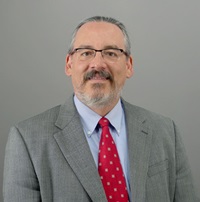 Robert (Bob) DeYoung is the Capitol Federal Distinguished Professor in Financial Markets and Institutions, and Harold Otto Professor of Economics, at the University of Kansas (KU) School of Business. He is also co-editor of the Journal of Money, Credit and Banking. Prior to his academic career, DeYoung spent 15 years in the research groups of the Office of the Comptroller of the Currency, the Federal Reserve Bank of Chicago, and the Federal Deposit Insurance Corporation. DeYoung has written extensively on the performance and regulation of financial institutions in leading academic journals, regulatory publications and the financial press. He earned a bachelor’s degree from Rutgers University-Camden in 1983 and a doctorate in economics from the University of Wisconsin-Madison in 1989.
Robert (Bob) DeYoung is the Capitol Federal Distinguished Professor in Financial Markets and Institutions, and Harold Otto Professor of Economics, at the University of Kansas (KU) School of Business. He is also co-editor of the Journal of Money, Credit and Banking. Prior to his academic career, DeYoung spent 15 years in the research groups of the Office of the Comptroller of the Currency, the Federal Reserve Bank of Chicago, and the Federal Deposit Insurance Corporation. DeYoung has written extensively on the performance and regulation of financial institutions in leading academic journals, regulatory publications and the financial press. He earned a bachelor’s degree from Rutgers University-Camden in 1983 and a doctorate in economics from the University of Wisconsin-Madison in 1989.
 Charles Evans is the president and chief executive officer of the Federal Reserve Bank of Chicago. In that capacity, he serves on the Federal Open Market Committee (FOMC), the Federal Reserve System's monetary policymaking body. Before becoming president in September 2007, Evans served as director of research and senior vice president, supervising the Bank's research on monetary policy, banking, financial markets and regional economic conditions. Prior to that, Evans was a vice president and senior economist with responsibility for the macroeconomics research group. His personal research has focused on measuring the effects of monetary policy on U.S. economic activity, inflation and financial market prices. It has been published in the Journal of Political Economy, American Economic Review, Journal of Monetary Economics, Quarterly Journal of Economics and the Handbook of Macroeconomics. Evans is active in the civic community. He is a trustee at Rush University Medical Center, a director of the Chicago Council on Global Affairs, a Governing Board member of Econ Illinois, a member of the Economic Club of Chicago Board of Directors and a member of the Civic Committee of the Commercial Club of Chicago, the Kellogg School of Management Global Advisory Board and Civic Consulting Alliance Board. Evans has taught at the University of Chicago, the University of Michigan and the University of South Carolina. He received a bachelor's degree in economics from the University of Virginia and a doctorate in economics from Carnegie-Mellon University in Pittsburgh.
Charles Evans is the president and chief executive officer of the Federal Reserve Bank of Chicago. In that capacity, he serves on the Federal Open Market Committee (FOMC), the Federal Reserve System's monetary policymaking body. Before becoming president in September 2007, Evans served as director of research and senior vice president, supervising the Bank's research on monetary policy, banking, financial markets and regional economic conditions. Prior to that, Evans was a vice president and senior economist with responsibility for the macroeconomics research group. His personal research has focused on measuring the effects of monetary policy on U.S. economic activity, inflation and financial market prices. It has been published in the Journal of Political Economy, American Economic Review, Journal of Monetary Economics, Quarterly Journal of Economics and the Handbook of Macroeconomics. Evans is active in the civic community. He is a trustee at Rush University Medical Center, a director of the Chicago Council on Global Affairs, a Governing Board member of Econ Illinois, a member of the Economic Club of Chicago Board of Directors and a member of the Civic Committee of the Commercial Club of Chicago, the Kellogg School of Management Global Advisory Board and Civic Consulting Alliance Board. Evans has taught at the University of Chicago, the University of Michigan and the University of South Carolina. He received a bachelor's degree in economics from the University of Virginia and a doctorate in economics from Carnegie-Mellon University in Pittsburgh.
 Michael Gou is a Ph.D. candidate in economics at the University of California, Irvine. His primary research focuses on studying U.S. financial history to answer policy questions pertaining to financial regulation. His current work evaluates the impact of bank capital requirements on the financial system in the early 20th century in the U.S. His research highlights the importance of studying the historical structure of the U.S. financial system to examine the effects of financial regulation on overall system stability.
Michael Gou is a Ph.D. candidate in economics at the University of California, Irvine. His primary research focuses on studying U.S. financial history to answer policy questions pertaining to financial regulation. His current work evaluates the impact of bank capital requirements on the financial system in the early 20th century in the U.S. His research highlights the importance of studying the historical structure of the U.S. financial system to examine the effects of financial regulation on overall system stability.
 Melanie Hall is the commissioner of the Montana Division of Banking and Financial Institutions. She was appointed by Gov. Brian Schweitzer in January 2011 and reappointed by Gov. Steve Bullock in January 2013. She provides the overall leadership to the banking division, which is responsible for the supervision of all state-chartered banks and state-chartered credit unions. These institutions have combined assets of more than $29 billion. In addition, the division licenses and examines more than 500 non-bank financial entities including mortgage lenders, mortgage servicers, and mortgage brokers, consumer loan companies, sales finance companies, deferred deposit lenders and escrow businesses. The division is responsible for processing all consumer complaints by Montanans against regulated and unregulated providers of financial services. Hall obtained her bachelor's degree in economics from Eckerd College in St. Petersburg, Fla., and her Juris Doctor from Tulane Law School in New Orleans, La. She serves on the board of the Conference of State Bank Supervisors and is the chair of the CSBS Education Foundation Board.
Melanie Hall is the commissioner of the Montana Division of Banking and Financial Institutions. She was appointed by Gov. Brian Schweitzer in January 2011 and reappointed by Gov. Steve Bullock in January 2013. She provides the overall leadership to the banking division, which is responsible for the supervision of all state-chartered banks and state-chartered credit unions. These institutions have combined assets of more than $29 billion. In addition, the division licenses and examines more than 500 non-bank financial entities including mortgage lenders, mortgage servicers, and mortgage brokers, consumer loan companies, sales finance companies, deferred deposit lenders and escrow businesses. The division is responsible for processing all consumer complaints by Montanans against regulated and unregulated providers of financial services. Hall obtained her bachelor's degree in economics from Eckerd College in St. Petersburg, Fla., and her Juris Doctor from Tulane Law School in New Orleans, La. She serves on the board of the Conference of State Bank Supervisors and is the chair of the CSBS Education Foundation Board.
 Joseph H. Haslag is a professor and Kenneth L. Lay Chair in Economics at the University of Missouri. Haslag received his doctorate in economics from Southern Methodist University in Dallas, Texas, in 1987. He spent 12 years in the research department at the Federal Reserve Bank of Dallas and also taught graduate and undergraduate courses at Southern Methodist University. He was a visiting scholar in the economics department at Michigan State University, East Lansing, Mich., in 2000, and in the department of monetary economics at Erasmus University, Rotterdam, the Netherlands, in 1994. He has published his research in prestigious academic journals including the Journal of Monetary Economics, Journal of Money, Credit, and Banking, The Review of Economics and Statistics, International Economic Review, and Review of Economic Dynamics.
Joseph H. Haslag is a professor and Kenneth L. Lay Chair in Economics at the University of Missouri. Haslag received his doctorate in economics from Southern Methodist University in Dallas, Texas, in 1987. He spent 12 years in the research department at the Federal Reserve Bank of Dallas and also taught graduate and undergraduate courses at Southern Methodist University. He was a visiting scholar in the economics department at Michigan State University, East Lansing, Mich., in 2000, and in the department of monetary economics at Erasmus University, Rotterdam, the Netherlands, in 1994. He has published his research in prestigious academic journals including the Journal of Monetary Economics, Journal of Money, Credit, and Banking, The Review of Economics and Statistics, International Economic Review, and Review of Economic Dynamics. Julapa Jagtiani joined the Federal Reserve Bank of Philadelphia as a special advisor in the Supervision, Regulation and Credit Department in 2008. In this role, she has conducted research and participated in or led several supervisory policy and implementation projects, including Comprehensive Capital Analysis and Review (CCAR) stress testing, recovery and resolution plans, and Basel II qualification reviews. She is also a fellow member of the Wharton Financial Institutions Center. Previously, Jagtiani was a senior economist at the Federal Reserve Banks of Kansas City and Chicago. Before joining the Federal Reserve System in 1998, she was an associate professor of finance at Baruch College and an assistant professor of finance at Syracuse University. Her research areas include banking policy-related issues, such as too big to fail, systemic risk and financial stability, Basel II capital regulations, mergers and acquisitions, equity and bond markets and mortgages and home equity issues. She received a doctorate in finance and a master's degree in business administration from New York University's Stern School of Business. She was a Rockefeller Foundation Fellowship recipient.
Julapa Jagtiani joined the Federal Reserve Bank of Philadelphia as a special advisor in the Supervision, Regulation and Credit Department in 2008. In this role, she has conducted research and participated in or led several supervisory policy and implementation projects, including Comprehensive Capital Analysis and Review (CCAR) stress testing, recovery and resolution plans, and Basel II qualification reviews. She is also a fellow member of the Wharton Financial Institutions Center. Previously, Jagtiani was a senior economist at the Federal Reserve Banks of Kansas City and Chicago. Before joining the Federal Reserve System in 1998, she was an associate professor of finance at Baruch College and an assistant professor of finance at Syracuse University. Her research areas include banking policy-related issues, such as too big to fail, systemic risk and financial stability, Basel II capital regulations, mergers and acquisitions, equity and bond markets and mortgages and home equity issues. She received a doctorate in finance and a master's degree in business administration from New York University's Stern School of Business. She was a Rockefeller Foundation Fellowship recipient. Glen Jammaron is the vice chairman and president of Alpine Banks of Colorado, Glenwood Springs, Colo. Jammaron graduated with a bachelor's degree in business in 1984 from Western State Colorado University in Gunnison, Colo. He started as a management trainee with Alpine Bank in 1985, and worked in all areas of the bank. He worked as a teller, lender, branch president, and bank director prior to assuming his current position as vice chairman and president. Jammaron serves on the boards of Carbondale Senior Housing, the Graduate School of Banking at the University of Colorado Boulder and the Colorado State Banking Bboard. He also volunteers his time as an active member of the Church of Carbondale and in his local Ducks Unlimited chapter.
Glen Jammaron is the vice chairman and president of Alpine Banks of Colorado, Glenwood Springs, Colo. Jammaron graduated with a bachelor's degree in business in 1984 from Western State Colorado University in Gunnison, Colo. He started as a management trainee with Alpine Bank in 1985, and worked in all areas of the bank. He worked as a teller, lender, branch president, and bank director prior to assuming his current position as vice chairman and president. Jammaron serves on the boards of Carbondale Senior Housing, the Graduate School of Banking at the University of Colorado Boulder and the Colorado State Banking Bboard. He also volunteers his time as an active member of the Church of Carbondale and in his local Ducks Unlimited chapter.
 Allan (Al) Landon is a general partner in Community BanCapital, Portland, Ore., a private investment fund providing capital to community banks. He is also an assistant dean and adjunct professor at the Eccles School of Business at the University of Utah. Previously, he was chairman and chief executive officer of Bank of Hawaii Corporation and the Bank of Hawaii, where he had also served as president and chief operating officer, chief financial officer and chief risk officer. Earlier in his career, Landon was chief financial officer of First American Corporation and First American National Bank, Nashville, Tenn. Before that, he was a partner and staff member at EY, where he served banking and other clients in several markets across the U.S. Landon earned his bachelor's degree in accounting from Iowa State University and is a certified public accountant. He serves as a director for the State Farm Mutual Automobile Insurance Company and State Farm Bank, Bloomington, Ill. He also serves on the national board of the Smithsonian Institution, where he is vice chairman, as well as the board of the Public Broadcasting System, where he chairs the audit committee. Landon serves on advisory boards at the University of Utah, including at its Center for Innovation in Banking and Financial Services. He previously served on the boards of MidFirst Bank, Oklahoma City, Okla., and the Federal Home Loan Bank of Seattle. He has served as chairman of the board of the Hawaii Medical Services Association and on the Board of Regents at the University of Hawaii. Landon is a past president of the Hawaii Bankers Association.
Allan (Al) Landon is a general partner in Community BanCapital, Portland, Ore., a private investment fund providing capital to community banks. He is also an assistant dean and adjunct professor at the Eccles School of Business at the University of Utah. Previously, he was chairman and chief executive officer of Bank of Hawaii Corporation and the Bank of Hawaii, where he had also served as president and chief operating officer, chief financial officer and chief risk officer. Earlier in his career, Landon was chief financial officer of First American Corporation and First American National Bank, Nashville, Tenn. Before that, he was a partner and staff member at EY, where he served banking and other clients in several markets across the U.S. Landon earned his bachelor's degree in accounting from Iowa State University and is a certified public accountant. He serves as a director for the State Farm Mutual Automobile Insurance Company and State Farm Bank, Bloomington, Ill. He also serves on the national board of the Smithsonian Institution, where he is vice chairman, as well as the board of the Public Broadcasting System, where he chairs the audit committee. Landon serves on advisory boards at the University of Utah, including at its Center for Innovation in Banking and Financial Services. He previously served on the boards of MidFirst Bank, Oklahoma City, Okla., and the Federal Home Loan Bank of Seattle. He has served as chairman of the board of the Hawaii Medical Services Association and on the Board of Regents at the University of Hawaii. Landon is a past president of the Hawaii Bankers Association.
 Ann Marie Mehlum is the associate administrator of capital access at the U.S. Small Business Administration (SBA). Mehlum serves as the SBA's chief loan officer and as a key member of SBA Administrator Maria Contreras-Sweet's senior staff. Mehlum oversees SBA programs that provide access to capital for American small businesses, including the Agency's long standing 7a general business loan guarantee program, the 504 Certified Development Company program and the Microloan and Surety Bond Guarantee programs. Mehlum has more than 35 years of banking experience. For a decade, she served as founding president and chief executive officer of Summit Bank in Eugene, Ore. She has served as senior vice president and chief credit administrator of Siuslaw Bank, Florence, Ore.; vice president of Manufacturers Bank in San Francisco and as assistant vice president of Wells Fargo Bank in San Francisco. She served on the FDIC's Advisory Council on Community Banking as a voice for America's community banks, and is a past president of the Oregon Bankers Association. In addition to her roles in the banking community, Mehlum has served on the boards of many non-profit and economic development organizations, including the Oregon Growth Board. Mehlum earned her master's degree in business administration from the University of California, Berkeley, and her Bachelor of Arts degree in economics from Pacific Lutheran University, Tacoma, Wash.
Ann Marie Mehlum is the associate administrator of capital access at the U.S. Small Business Administration (SBA). Mehlum serves as the SBA's chief loan officer and as a key member of SBA Administrator Maria Contreras-Sweet's senior staff. Mehlum oversees SBA programs that provide access to capital for American small businesses, including the Agency's long standing 7a general business loan guarantee program, the 504 Certified Development Company program and the Microloan and Surety Bond Guarantee programs. Mehlum has more than 35 years of banking experience. For a decade, she served as founding president and chief executive officer of Summit Bank in Eugene, Ore. She has served as senior vice president and chief credit administrator of Siuslaw Bank, Florence, Ore.; vice president of Manufacturers Bank in San Francisco and as assistant vice president of Wells Fargo Bank in San Francisco. She served on the FDIC's Advisory Council on Community Banking as a voice for America's community banks, and is a past president of the Oregon Bankers Association. In addition to her roles in the banking community, Mehlum has served on the boards of many non-profit and economic development organizations, including the Oregon Growth Board. Mehlum earned her master's degree in business administration from the University of California, Berkeley, and her Bachelor of Arts degree in economics from Pacific Lutheran University, Tacoma, Wash.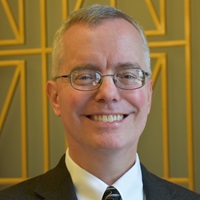 Andrew P. Meyer is a senior economist in the Community Bank Research and Outreach office of the Federal Reserve Bank of St. Louis. He received a doctorate in economics from Washington University in St. Louis and has worked at the Federal Reserve since 1994. In addition to his research on community banking issues, Meyer conducts statistical analysis of the downgrade and failure risk of commercial banks. He also serves on a committee to improve the Federal Reserve's off-site bank surveillance program and has taught regularly in examiner training schools.
Andrew P. Meyer is a senior economist in the Community Bank Research and Outreach office of the Federal Reserve Bank of St. Louis. He received a doctorate in economics from Washington University in St. Louis and has worked at the Federal Reserve since 1994. In addition to his research on community banking issues, Meyer conducts statistical analysis of the downgrade and failure risk of commercial banks. He also serves on a committee to improve the Federal Reserve's off-site bank surveillance program and has taught regularly in examiner training schools.
 Michelle C. Neely is an economist in the Community Bank Research and Outreach office of the Federal Reserve Bank of St. Louis. She received a master’s degree in economics from the Australian National University in Canberra, Australia, and earned undergraduate degrees in journalism, economics and policy studies from Syracuse University, Syracuse, N.Y. She has worked at the Federal Reserve for more than 20 years, with the first 10 years spent in the Research Department. In addition to research on community banking issues, she conducts analysis of regulatory and legislative issues related to the banking industry.
Michelle C. Neely is an economist in the Community Bank Research and Outreach office of the Federal Reserve Bank of St. Louis. She received a master’s degree in economics from the Australian National University in Canberra, Australia, and earned undergraduate degrees in journalism, economics and policy studies from Syracuse University, Syracuse, N.Y. She has worked at the Federal Reserve for more than 20 years, with the first 10 years spent in the Research Department. In addition to research on community banking issues, she conducts analysis of regulatory and legislative issues related to the banking industry.
 Jerome H. Powell took office as a member of the Board of Governors of the Federal Reserve System on May 25, 2012, to fill an unexpired term. He was reappointed and sworn in on June 16, 2014, for a term ending Jan. 31, 2028. Prior to his appointment, Powell was a visiting scholar at the Bipartisan Policy Center in Washington, D.C., where he focused on federal and state fiscal issues. From 1997 through 2005, Powell was a partner at The Carlyle Group. Powell served as an assistant secretary and as undersecretary of the Treasury under President George H.W. Bush, with responsibility for policy on financial institutions, the Treasury debt market and related areas. Prior to joining the administration, he worked as a lawyer and investment banker in New York City. He received an A.B. in politics from Princeton University in 1975 and earned a law degree from Georgetown University in 1979. While at Georgetown, he was editor-in-chief of the Georgetown Law Journal.
Jerome H. Powell took office as a member of the Board of Governors of the Federal Reserve System on May 25, 2012, to fill an unexpired term. He was reappointed and sworn in on June 16, 2014, for a term ending Jan. 31, 2028. Prior to his appointment, Powell was a visiting scholar at the Bipartisan Policy Center in Washington, D.C., where he focused on federal and state fiscal issues. From 1997 through 2005, Powell was a partner at The Carlyle Group. Powell served as an assistant secretary and as undersecretary of the Treasury under President George H.W. Bush, with responsibility for policy on financial institutions, the Treasury debt market and related areas. Prior to joining the administration, he worked as a lawyer and investment banker in New York City. He received an A.B. in politics from Princeton University in 1975 and earned a law degree from Georgetown University in 1979. While at Georgetown, he was editor-in-chief of the Georgetown Law Journal.
 Robin A. Prager is a senior adviser in the Division of Research and Statistics at the Board of Governors of the Federal Reserve System. She joined the Board staff in 1994 as an economist in the Financial Structure Section, and served as chief of the Financial Structure Section from 2000 to 2007. Throughout her tenure at the Board, Prager has been involved in conducting economic analysis of issues relating to the structure and performance of the financial services sector, with an emphasis on banking. Recently, much of her attention has been devoted to issues surrounding the availability of credit to small businesses and the role of community banks in the U.S. financial system. Prager received a bachelor's degree in economics from Harvard University and a doctorate in economics from the Massachusetts Institute of Technology. Prior to joining the staff of the Federal Reserve Board, Prager served on the faculty of the Owen Graduate School of Management at Vanderbilt University. She has also been a visiting faculty member at Boston University's School of Management and MIT's Sloan School of Management, and a visiting senior policy scholar at Georgetown University's Center for Business and Public Policy. She currently serves on the board of the Industrial Organization Society and on the editorial boards of the Review of Industrial Organization and Journal of Regulatory Economics.
Robin A. Prager is a senior adviser in the Division of Research and Statistics at the Board of Governors of the Federal Reserve System. She joined the Board staff in 1994 as an economist in the Financial Structure Section, and served as chief of the Financial Structure Section from 2000 to 2007. Throughout her tenure at the Board, Prager has been involved in conducting economic analysis of issues relating to the structure and performance of the financial services sector, with an emphasis on banking. Recently, much of her attention has been devoted to issues surrounding the availability of credit to small businesses and the role of community banks in the U.S. financial system. Prager received a bachelor's degree in economics from Harvard University and a doctorate in economics from the Massachusetts Institute of Technology. Prior to joining the staff of the Federal Reserve Board, Prager served on the faculty of the Owen Graduate School of Management at Vanderbilt University. She has also been a visiting faculty member at Boston University's School of Management and MIT's Sloan School of Management, and a visiting senior policy scholar at Georgetown University's Center for Business and Public Policy. She currently serves on the board of the Industrial Organization Society and on the editorial boards of the Review of Industrial Organization and Journal of Regulatory Economics. H.E. "Gene" Rainbolt is the chairman of BancFirst Corp. in Oklahoma City, Okla. He acquired his first bank, First American Bank in Purcell, Okla., in 1962. In 1965, he acquired Federal National Bank in Shawnee, Okla., and in 1967, he and a group of investors commenced acquiring banks throughout Oklahoma. This led to the formation of United Community Corp., the state's first multi-bank holding company. BancFirst was founded in 1989 and is now the largest state-chartered bank in Oklahoma, with assets exceeding $6 billion and with offices in 54 communities. Rainbolt is a graduate of the University of Oklahoma with both undergraduate and graduate degrees. His alma mater has honored him on multiple occasions, including its Distinguished Service Award and an honorary doctorate. In 1999, Rainbolt was inducted into the Oklahoma Hall of Fame. He has received honorary doctorate degrees from Oklahoma Baptist University, Oklahoma City University and Oklahoma Christian University. A strong advocate of improving and diversifying the Oklahoma economy, Rainbolt has worked to improve health and education, to provide better access to capital and to develop Oklahoma's infrastructure system. He has served on numerous civic, economic development, chamber of commerce, youth, medical, zoological, arts and banking organizations. One of his most recent projects has been to enhance the entrepreneurial classes and entrepreneurial activities at universities in Oklahoma. Rainbolt has served as president of the Oklahoma Bankers Association and as the chairman of the Academy for State Goals and the Oklahoma State Chamber of Commerce. He is a former director of Leadership Oklahoma and the Great Expectations Foundation. He was a founding director of Calm Waters Center for Children and Families, and has served on many other charitable boards. Rainbolt is a member of the leadership council of the Charles and Peggy Stephenson Oklahoma Cancer Center and recently served on University of Texas MD Anderson Cancer Center Board of Visitors. Rainbolt and his family are committed supporters of the University of Oklahoma, the University of Oklahoma Health Sciences Center and the Oklahoma Medical Research Foundation.
H.E. "Gene" Rainbolt is the chairman of BancFirst Corp. in Oklahoma City, Okla. He acquired his first bank, First American Bank in Purcell, Okla., in 1962. In 1965, he acquired Federal National Bank in Shawnee, Okla., and in 1967, he and a group of investors commenced acquiring banks throughout Oklahoma. This led to the formation of United Community Corp., the state's first multi-bank holding company. BancFirst was founded in 1989 and is now the largest state-chartered bank in Oklahoma, with assets exceeding $6 billion and with offices in 54 communities. Rainbolt is a graduate of the University of Oklahoma with both undergraduate and graduate degrees. His alma mater has honored him on multiple occasions, including its Distinguished Service Award and an honorary doctorate. In 1999, Rainbolt was inducted into the Oklahoma Hall of Fame. He has received honorary doctorate degrees from Oklahoma Baptist University, Oklahoma City University and Oklahoma Christian University. A strong advocate of improving and diversifying the Oklahoma economy, Rainbolt has worked to improve health and education, to provide better access to capital and to develop Oklahoma's infrastructure system. He has served on numerous civic, economic development, chamber of commerce, youth, medical, zoological, arts and banking organizations. One of his most recent projects has been to enhance the entrepreneurial classes and entrepreneurial activities at universities in Oklahoma. Rainbolt has served as president of the Oklahoma Bankers Association and as the chairman of the Academy for State Goals and the Oklahoma State Chamber of Commerce. He is a former director of Leadership Oklahoma and the Great Expectations Foundation. He was a founding director of Calm Waters Center for Children and Families, and has served on many other charitable boards. Rainbolt is a member of the leadership council of the Charles and Peggy Stephenson Oklahoma Cancer Center and recently served on University of Texas MD Anderson Cancer Center Board of Visitors. Rainbolt and his family are committed supporters of the University of Oklahoma, the University of Oklahoma Health Sciences Center and the Oklahoma Medical Research Foundation.
 Richard (Rick) Sanborn is a director and president and chief executive officer of Seacoast Commerce Bank, San Diego, Calif. Sanborn joined Seacoast in October 2007 as part of a turn-around strategy, and has served as a director, president and CEO since that time. He is a more-than-32-year veteran of the financial services industry (25 years in banking), where he has held executive level positions in several institutions ranging in asset size from $60 million to $5 billion. He has experience in all facets of banking including executive management, lending, operations, strategic planning, mergers and acquisitions. Prior to joining Seacoast, Sanborn was the executive vice president and chief banking officer for Pacific Western Bank, a $5 billion bank headquartered in San Diego. Sanborn is very active in the banking industry, serving as a past chairman of the California Bankers Association and as a member of the Small Business Lending Committee of the Independent Community Bankers of America and of the executive committee of the American Bankers Association's Government Relations Council. Sanborn holds a bachelor's degree in accounting from Bentley College in Waltham, Mass. and a master's degree in business administration from California Pacific University in San Diego.
Richard (Rick) Sanborn is a director and president and chief executive officer of Seacoast Commerce Bank, San Diego, Calif. Sanborn joined Seacoast in October 2007 as part of a turn-around strategy, and has served as a director, president and CEO since that time. He is a more-than-32-year veteran of the financial services industry (25 years in banking), where he has held executive level positions in several institutions ranging in asset size from $60 million to $5 billion. He has experience in all facets of banking including executive management, lending, operations, strategic planning, mergers and acquisitions. Prior to joining Seacoast, Sanborn was the executive vice president and chief banking officer for Pacific Western Bank, a $5 billion bank headquartered in San Diego. Sanborn is very active in the banking industry, serving as a past chairman of the California Bankers Association and as a member of the Small Business Lending Committee of the Independent Community Bankers of America and of the executive committee of the American Bankers Association's Government Relations Council. Sanborn holds a bachelor's degree in accounting from Bentley College in Waltham, Mass. and a master's degree in business administration from California Pacific University in San Diego.
 Rajdeep Sengupta is an economist at the Federal Reserve Bank of Kansas City. He joined the Banking Research Department at the Kansas City Fed in 2013. Previously, he has worked at the Planning Commission of India and at the Federal Reserve Bank of St. Louis. He received his doctorate in economics from Vanderbilt University, Nashville, Tenn. His main areas of research are in banking and financial intermediation.
Rajdeep Sengupta is an economist at the Federal Reserve Bank of Kansas City. He joined the Banking Research Department at the Kansas City Fed in 2013. Previously, he has worked at the Planning Commission of India and at the Federal Reserve Bank of St. Louis. He received his doctorate in economics from Vanderbilt University, Nashville, Tenn. His main areas of research are in banking and financial intermediation.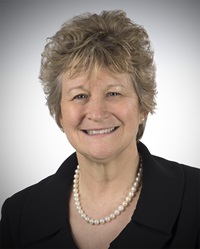
Julie Stackhouse is executive vice president and managing officer of supervision, credit, community development and learning innovation for the Federal Reserve Bank of St. Louis. Prior to joining the St. Louis Fed in September 2002, Stackhouse served as vice president and managing officer of the Risk Management department of the Federal Reserve Bank of Minneapolis. In addition, she was formerly an officer with the Federal Reserve Bank of Kansas City prior to relocating to Minnesota in 1995. She served in many capacities at the Kansas City Reserve Bank, starting as an examiner in 1980. Stackhouse holds a bachelor's degree in business administration from Drake University and is a graduate of the Wisconsin Graduate School of Banking. She currently serves as president-elect of the Board for National Charity League, Inc., a mother-daughter philanthropic organization, and as a member of the St. Louis Forum. In 2010, Stackhouse was named a St. Louis Business Journal “Most Influential Business Women” recipient, and in 2016, was recognized with the Delta Sigma Pi Lifetime Achievement Award.

Michael Stevens is the senior executive vice president at the Conference of State Bank Supervisors (CSBS). He is responsible for leading the organization's public policy, financial supervision, federal coordination, communications, industry relations and professional development functions. Stevens also serves as the principal deputy to the state banking member of the Financial Stability Oversight Council. Prior to his appointment in September 2011, he served as the senior vice president for regulatory policy, representing the state banking system in the development of policy in the areas of financial stability, prudential supervision and consumer protection. He joined CSBS in 1999 to work in all facets of CSBS's professional development division. Stevens is a frequent instructor and speaker on banking policy, examinations and financial analysis. He serves on the faculty of the Graduate School of Banking at Colorado and at Texas Tech University's School of Banking. He began his regulatory career as a bank examiner for the Iowa Division of Banking, where he served 11 years.
 Mick Thompson was appointed Oklahoma Commissioner of Banks on Sept. 1, 1992, by Gov. David Walters. He was reappointed by Gov. Frank Keating in 1996 and 2000, by Gov. Brad Henry in 2004 and 2008, and by Gov. Mary Fallin in 2012 and 2016. Thompson has held this position longer than any other bank commissioner in Oklahoma's history. He came to the position with experience as executive vice president of Central National Bank, Poteau, Okla., from 1977 to 1990. Thompson was a state representative from Poteau from 1976 to 1984, serving as chairman of the House Banking and Finance Committee, as majority floor leader from 1983-84, and as a member of the Appropriations and Budget Committee. During his tenure as chairman of the Banking and Finance Committee, the Oklahoma legislature enacted the state's first branch banking and multi-bank holding company laws. Prior to being appointed bank commissioner, Thompson was director of legislative and governmental relations for the Oklahoma governor's office. Thompson earned a bachelor's degree from Southeastern Oklahoma State University, Durant, Okla., where he currently serves on the advisory council for the School of Business. He earned a master's degree in education from Northeastern State University, Tahlequah, Okla., as well as a graduate degree in banking from the University of Colorado Boulder. The Graduate School of Banking at Colorado recently awarded him the James C. Scarboro Memorial Award, which is presented annually to a commercial banker or banking educator who has provided outstanding leadership to the banking community and/or banking education nationwide. Thompson served as president of the Oklahoma Community Bankers Association from 1988 to 1990, and was chairman of the Oklahoma Development Finance Authority from 1988 to 1989. In 2003, Thompson served as chairman of the Conference of State Bank Supervisors (CSBS). He has served as a member and chairman of the CSBS legislative committee. He has also served as CSBS Division IV chairman and vice chairman, as a member of the CSBS national accreditation board, and as chairman of the CSBS nominating committee. Thompson also served on the board of trustees of the Graduate School of Banking at Colorado and currently serves as advisor to the board. In addition, Thompson has been a member of the state liaison committee of the Federal Financial Institutions Examinations Council (FFIEC), Washington, D.C.
Mick Thompson was appointed Oklahoma Commissioner of Banks on Sept. 1, 1992, by Gov. David Walters. He was reappointed by Gov. Frank Keating in 1996 and 2000, by Gov. Brad Henry in 2004 and 2008, and by Gov. Mary Fallin in 2012 and 2016. Thompson has held this position longer than any other bank commissioner in Oklahoma's history. He came to the position with experience as executive vice president of Central National Bank, Poteau, Okla., from 1977 to 1990. Thompson was a state representative from Poteau from 1976 to 1984, serving as chairman of the House Banking and Finance Committee, as majority floor leader from 1983-84, and as a member of the Appropriations and Budget Committee. During his tenure as chairman of the Banking and Finance Committee, the Oklahoma legislature enacted the state's first branch banking and multi-bank holding company laws. Prior to being appointed bank commissioner, Thompson was director of legislative and governmental relations for the Oklahoma governor's office. Thompson earned a bachelor's degree from Southeastern Oklahoma State University, Durant, Okla., where he currently serves on the advisory council for the School of Business. He earned a master's degree in education from Northeastern State University, Tahlequah, Okla., as well as a graduate degree in banking from the University of Colorado Boulder. The Graduate School of Banking at Colorado recently awarded him the James C. Scarboro Memorial Award, which is presented annually to a commercial banker or banking educator who has provided outstanding leadership to the banking community and/or banking education nationwide. Thompson served as president of the Oklahoma Community Bankers Association from 1988 to 1990, and was chairman of the Oklahoma Development Finance Authority from 1988 to 1989. In 2003, Thompson served as chairman of the Conference of State Bank Supervisors (CSBS). He has served as a member and chairman of the CSBS legislative committee. He has also served as CSBS Division IV chairman and vice chairman, as a member of the CSBS national accreditation board, and as chairman of the CSBS nominating committee. Thompson also served on the board of trustees of the Graduate School of Banking at Colorado and currently serves as advisor to the board. In addition, Thompson has been a member of the state liaison committee of the Federal Financial Institutions Examinations Council (FFIEC), Washington, D.C.
 Todd Vermilyea is a senior associate director in the Division of Banking Supervision and Regulation at the Board of Governors of the Federal Reserve System. Vermilyea is responsible for the division's risk, surveillance and data collections functions. In this role, he leads supervisory risk monitoring across the Federal Reserve System to promote consistent views of risk and their translation to policy formulation and supervisory activities. Previously, Vermilyea was a vice president at the Federal Reserve Bank of Philadelphia, where he oversaw both the retail risk analysis and banking surveillance units. Vermilyea joined the Federal Reserve Bank of Philadelphia in 2002 as a supervisory economist. He previously worked as a national community bank examiner with the Office of the Comptroller of the Currency. Vermilyea earned his doctorate in economics from the University of South Carolina, Columbia, S.C., and has published articles in several leading academic journals focused on banking and regulation.
Todd Vermilyea is a senior associate director in the Division of Banking Supervision and Regulation at the Board of Governors of the Federal Reserve System. Vermilyea is responsible for the division's risk, surveillance and data collections functions. In this role, he leads supervisory risk monitoring across the Federal Reserve System to promote consistent views of risk and their translation to policy formulation and supervisory activities. Previously, Vermilyea was a vice president at the Federal Reserve Bank of Philadelphia, where he oversaw both the retail risk analysis and banking surveillance units. Vermilyea joined the Federal Reserve Bank of Philadelphia in 2002 as a supervisory economist. He previously worked as a national community bank examiner with the Office of the Comptroller of the Currency. Vermilyea earned his doctorate in economics from the University of South Carolina, Columbia, S.C., and has published articles in several leading academic journals focused on banking and regulation.
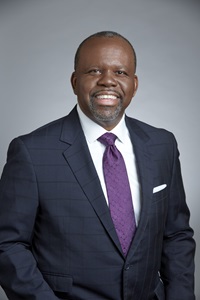
Darrin Williams is the CEO of Arkadelphia, Ark.-based Southern Bancorp Inc., a $1.2 billion asset financial organization with more than 80,000 customers and 43 locations primarily in underserved markets in the Mid-South. As CEO, Williams oversees the strategic direction and operations of each of Southern's three Community Development Financial Institutions: Southern Bancorp Inc., a bank holding company; Southern Bancorp Bank, one of America's largest rural development banks; and Southern Bancorp Community Partners, a 501(c)(3) development finance and lending organization – collectively known as "Southern." Prior to leading Southern, Williams served as managing partner at the law firm of Carney, Williams, Bates, Pulliam & Bowman, PLLC, where he represented institutional investors and consumers in class action litigation against some of the nation's largest publicly traded companies. He also served three terms in the Arkansas House of Representatives (2008-2013), serving as Speaker Pro Tempore of the 89th Arkansas General Assembly. He was listed as one of 12 state legislators from around the country to watch by Governing magazine. Williams received his Bachelor of Arts from Hendrix College, Conway, Ark.; his Juris Doctor from Vanderbilt University School of Law, Nashville, Tenn.; and his Master of Laws degree in securities and financial regulation from Georgetown University Law Center in Washington, D.C.
Video Gallery

